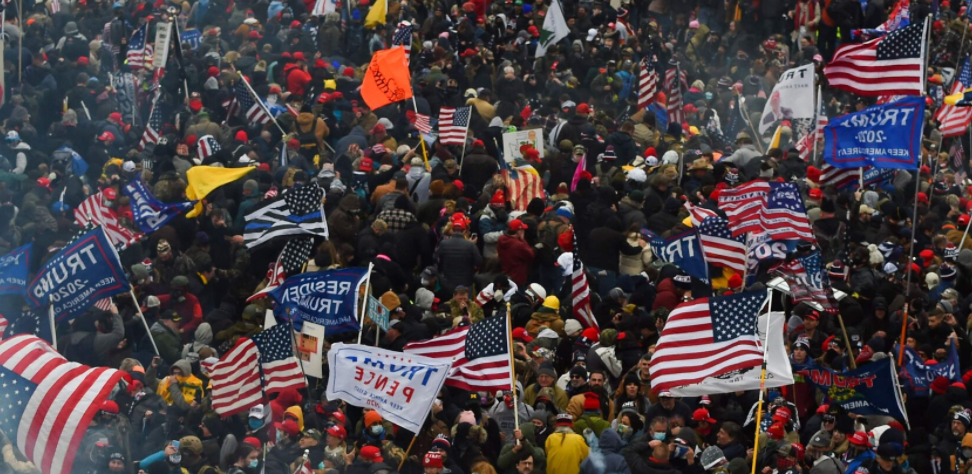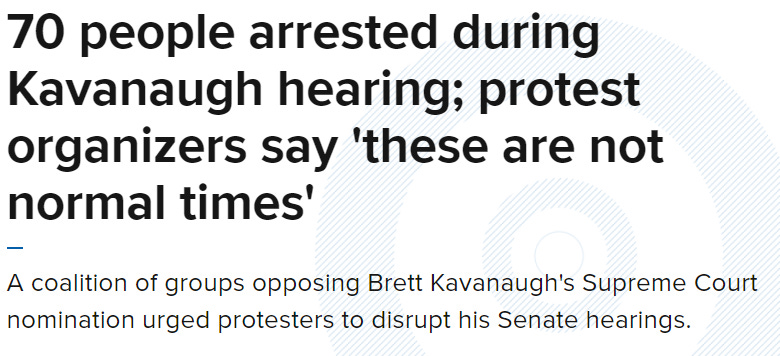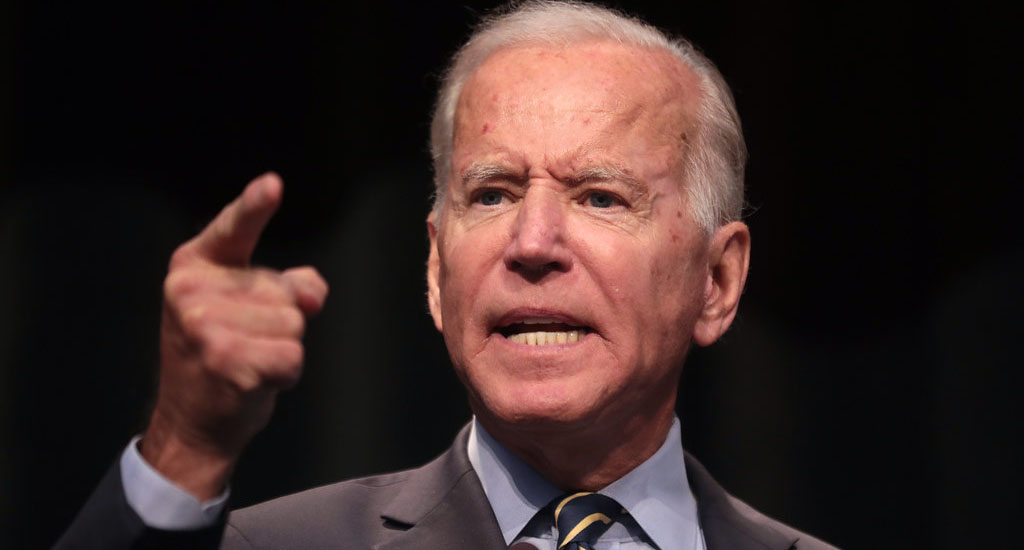January 6th, 2021 was no high-water mark for America by any stretch.
Nor was September 4th, 2018.
We don’t talk much about September 4th, but in case people need reminding, September 4th was the day where yet another moment where a violent mob attempted to storm the U.S. Capitol in order to disrupt the peaceful transfer of power — this time at the behest of Democratic politicians and pressure organizations such as Planned Parenthood in order to stop Brett Kavanaugh’s hearings before the Senate Judiciary Committee.
Yet the only tactile difference between J6 and S4? One mob made it inside; the other mob didn’t. Both were violent, neither had a discernable end game, and neither had any legal legitimacy. Their rectitude justified the act, and no amount of reason will dissuade.
Before we spit out our coffee in mindless rage that we are excusing the inexcusable, what follows is not an attempt to equivocate what happened in January (or in September) but rather to point to a much more dangerous phenomenon.
One will notice the J6 organizers caged their actions as a defense of civil rights and the American republic. In contrast, how did the S4 organizers cage their actions? Was it an insurrection? A riot? A coup d’etat??
Protest organizers defended their intentionally disruptive strategy as vital to preserving civil rights and democracy. They described Kavanaugh’s views on women’s rights, LGBT issues and health care as extreme and decried Trump’s authority to nominate him.
“The protests are not normal, but these are not normal times,” said Jennifer Epps-Addison, network president and co-executive director of the Center for Popular Democracy Action, which helped coordinate the protests. “These women are standing up because they know that if they’re quiet now and they allow these rigged, shamed hearings to proceed, their lives are going to be impacted in the future.” (emphasis added)
The old line that it’s only fascism when they do it comes to mind. Or the old line from Benjamin Franklin in the Broadway play 1776:
Oh, Mr. Dickinson, I’m surprised at you. You should know that rebellion is always legal in the first person, such as “our rebellion.” It is only in the third person – “their rebellion” – that it is illegal.
Such is the mind of the partisan — and that my friends is where the problem lies, because only for the partisan does an illegal act become justified in spite of what is legal and right.
January 6th: Where Republicans Behaved Like Democrats
Of course, far be it from me or any rational and sane person to defend anything that happened on either January 6th or September 4th.
This morning’s Wall Street Journal has an op-ed from former Bush strategist Karl Rove, who puts the question rather directly:
So, on this anniversary, here’s a simple thought experiment: What if the other side had done it? What if in early January 2017, Democrats similarly attired and armed had stormed the Capitol and attempted to keep Congress from receiving the Electoral College results for the 2016 presidential election?
I think we know the answer.
We would light the Democrats up like a Christmas tree. But we also instinctively know the counterargument, and it is rather simple: the Democrats would deny anything serious had happened and make comparisons to other activist-inspired moments of effusion — moments like September 4th — and deny anything serious ever happened on January 6th.
We know this.
We all know this.
Clausewitz argued famously in On War that warfare was a continuation of politics. Clausewitz was wrong. Violence is a failure of politics. Violence is the end of politics. Gerrymandering violence into self-defense is cheap theater and the game of those who are more sociopath than Cassandra.
Carl Schmitt writes in The Theory of the Partisan that it is not states but rather parties which are ultimately totalitarian. Simone Weil thought likewise in her treatise On The Abolition of Political Parties. It is one thing to disagree as American political parties used to do — what we in Virginia used to call The Virginia Way. Something else to adopt the partisanship of the Jacobins who found one party in power and the other in prison. If the party is the organ of truth, then truth is the only thing a partisan can think or believe.
Hence the real danger comes not from state institutions but from partisans in politics who are quick to separate friends from enemies, driving individuals away from the institutions and towards political agitation. As Schmitt notes:
Consequently, the partisan problem is also very easy to solve: if partisans are controlled by the [party], they are freedom fighters and glorious heroes; if they shun this control, they are anarchistic rifraff and enemies of humanity.
The problem in the United States is that the political left possesses five of the seven institutions — and does not suffer rivals. Consider for a moment that Jennifer Rubin at the Washington Post remains the most conservative (sic) writer that the organization will suffer. Or how public education demands to teach secular dogmas such as Critical Race Theory and Drag Queen Story Hour. Or how students and professors have been drummed out of academia to the point where conservatives learn to say nothing for fear of being drummed out. Either bend the knee, recognize the sacraments of the left such as abortion and mock marriage, use the correct gender pronouns, and bend to the neoliberal corporatist muddle — or join the partisans.
Such a false choice is already wearing thin, even in Europe. Even the French — typically the vanguard for all things politically progressive — have adopted a new term for this American intolerance called wokeisme as a brand for the mentally unstable progressive movement who cannot be told otherwise and will not change the subject. Just because you feel something — even strongly or in error — doesn’t make it an argument.
Let’s not be blind to the long tradition of left-wing violence in America either. From the 1960s Vietnam era protests through the leftist bombing campaigns of the 1970s, to the Bush-era anti-war protests, open harassment of Republicans by Obama’s “Call ‘Em Out” campaign and harassing Republican in public spaces, to the BLM/Antifa riots (insurrection?) of 2020 — one would be hard pressed not to think of this sort of open pressure bordering on (and spilling into) actual violence as a feature and not a bug of Democratic politics.
Therefore riots— dare we say insurrections? — such as September 4th could be tolerated by the media and the establishment as the highest form of democracy. Provided their source came from the political left, of course.
Violence could be tolerated, you see — provided if the cause was perceived and excused as justified. How many Republicans had to endure the equivocations of left-leaning friends during the violent BLM/Antifa protests of 2020? What lessons were the other half of the nation supposed to gather?
Violence — it seems — becomes the monopolized privilege of the political left whenever it refuses to acquiesce whether it is national politics or local school boards, the option or threat of an option is made omnipresent and tangible, and when needed quite real.
Political terrorism — and it has a definition that includes the threat or use of violence — had been the monopoly of the frustrated leftist for the better part of five decades in America.
That is — until January 6th.
Which is why you don’t see too many Republicans going out of their way to condemn the event with nothing more than an unfortunate grimace. Which bothers me for no other reason than it substitutes direct action — what can only be termed as political terrorism — as the final arbiter of disputes. Not elections or law or the decision of court justices, but rather the whims of a Jacobin mob.
There Is Only One Question To Answer: Will The Political Left Return to Pluralism or Not?
One of the hallmarks of liberal democracy is that it is a function of two outcomes: (1) a decision that everyone can live with ethically and (2) a decision that is morally right. Lawmaking becomes an inherently moral process; we routinely ask lawmakers to approve of moral laws, reject immoral laws, and ask that they discern between the two.
Our grandfathers used to understand this. Desegregation was possible ethically because it was right morally. Defeating the Soviet Union was cast by President Ronald Reagan as the United States against the Evil Empire. President George W. Bush cast the war against terrorism in simple Manichean terms.
Our fathers surrendered the rules of the game to temporary advantage. Consensus was traded for conquest, and the conflation of moral is and moral ought became policy as we thought of the children rather than thought. To borrow from Thucydides:
Words had to change their ordinary meaning and to take that which was now given them. Reckless audacity came to be considered the courage of a loyal ally; prudent hesitation, specious cowardice; moderation was held to be a cloak for unmanliness; ability to see all sides of a question inaptness to act on any. Frantic violence, became the attribute of manliness; cautious plotting, a justifiable means of self-defence.
The advocate of extreme measures was always trustworthy; his opponent a man to be suspected.
. . .
The cause of all these evils was the lust for power arising from greed and ambition; and from these passions proceeded the violence of parties once engaged in contention.
. . .
In this contest the blunter wits were most successful. Apprehensive of their own deficiencies and of the cleverness of their antagonists, they feared to be worsted in debate and to be surprised by the combinations of their more versatile opponents, and so at once boldly had recourse to action: while their adversaries, arrogantly thinking that they should know in time, and that it was unnecessary to secure by action what policy afforded, often fell victims to their want of precaution.
— Thucydides, History of the Peloponnesian War (III, 82-83)
One is hard press to find where the political right has conquered many hills over the last few decades.
Defeating the Soviet Union in the early 1990s and defeating Islamist terrorism in the Bush naughties — yet on abortion, welfare, gender ideology, health care, media bias, government-run education, colleges and universities and even churches the political left has enjoyed an almost unchecked 20-year run. Even Citizens United looks rather suspect in an era of woke capitalism.
Compound the problem with a monopoly on political violence and it is no small wonder how January 6th becomes a problem, not because a long series of leftist violence makes such events acceptable, but because January 6th becomes the caricature of where rank-and-file Republicans believe Democrats want the discourse to become.
What options are there otherwise?
Show me the conservative columnists in Virginia. Show me the conservative newspaper of record? Name one center-right public college or university? Show me an education system favorable to school vouchers and student choice? Show me an entertainment establishment that isn’t cramming our eyes full of vulgarity and mediocrity and selling it as wit and talent? We cannot do it precisely because the partisans have taken over the institutions — partisans of the left as narrow and cruel as any Torquemada.
There’s the problem in a nutshell.
It isn’t that the political right chose not to live with the political left — heck, the whole idea of American pluralism came from the old Protestant integralism of the Founding Fathers. Rather, it is that an off-shelf brand version of French postmodern thought took root in the American left and will tolerate no rivals because it lacks both the education and empathy to do so.
The Enemy Is Violence; Not One Another
The Greek root of democracy was no compliment — the kratia (brute force) of the demos (the mob) was something to be restrained, susceptible to faction and demagogues. Plato reflected that tyche — change — was a constant that invited hybris (pride) which in turn invited nemesis.
That reckoning brought about by nemesis was inevitably violent, which invited polemos (violence) and ultimately stasis (civil war). If you could remedy this chain at any point, it is when change invites hubris — and our partisan political climate views such magnanimity as a form of weakness in the face of an enemy.
Schmitt’s ultimate confession — that only the admission of this enmity between factions could prevent a total enmity from presenting itself — seems important here, if for no other reason than it would require a certain introspection from the political left in this country that events such as September 4th pave the road for events such as January 6th. One remains unoptimistic — but urgently hopeful — that such a realization is in the cards.
Yet in equal terms, Republicans should understand that events such as January 6th only invite the partisans of the left to play by a lower threshold of far more dangerous rules in the face of an absolute enemy that must be destroyed (sic). What’s more, such events normalize political violence. An insurrection? Not hardly. Unacceptable? As unacceptable as the BLM/Antifa riots that killed 25 people, shuttered hundreds of businesses, and caused millions of dollars in property damages — and we should have the courage to condemn both.
See where this goes?
If there are statesmen left — and how few there are — the task at hand is to cure hybris before it revisits itself as nemesis. That will require statesmen willing to find some sort of Stunde null with the loyal opposition and start building from there — without surrendering the discourse to the partisans. Back to Adam Krull’s TNR article on Simone Weil:
Democracy functions by recognizing that politics is not a matter of finding the right answer, but of coming up with an answer that everyone agree to live with. That is why liberal democracy never satisfies those, like Weil, who are in search of perfect truth and goodness, or who see politics as a form of soul-making. In this sense, Weil herself has more in common with the totalitarian parties she attacks than she does with liberalism. Like them, she insists on a single truth, and demonizes those who oppose her as enemies of truth.
The danger in American politics today is that, on more and more issues, we are falling into this same Manicheanism, in which each party accuses the other, not just of error, but of treason and evil. Democracy only works if our loyalty to the collective is more powerful than our insistence on our own righteousness. When righteousness and loyalty cannot be reconciled—as they finally couldn’t over the issue of slavery—democracy fails, and the only resort is to violence. Parties ought to help avert that kind of apocalyptic conflict, by forming coalition in support of political consensus. The more ideologically embittered our parties become, the greater the danger we face of returning to Simone Weil’s world, where the very word “party” can only be a curse.
One suspects we are already at Weil’s breaking point. Of course, a return to ethical liberalism on par with Jeffersonian conservative values will require a great deal of surrender on the part of those who have held the reins of government for 8 years in Virginia are still possess nearly all of the institutions. We should welcome that discourse — if it comes at all.
That’s — my friends — how public trust will be restored post-J6. Yet remember why the political left is so angry about J6 — not because it was violent, but because it broke the five-decade long monopoly on political violence the left enjoyed and leveraged. Nemesis arrived in grand style.
Whether the left destroys what remains of the liberal tradition in the United States in an effort to “save democracy” remains to be seen — yet while a line was crossed on January 6th, one worries intensely that it is not the line anyone else is talking about. That should worry us as well.








